Instant messaging has become a primary way for businesses to connect with customers. Imagine this: a potential customer is one click away from completing a purchase on your website but has a few lingering questions.
Without real-time support, they may abandon their cart, turning a promising lead into a missed opportunity.
You can avoid this by adopting an efficient customer communication platform that enables you to address consumer issues. According to a Zendesk CX Trends report, over 70% of consumers expect natural, conversational experiences.
In this article, we’ll talk about the following customer messaging platforms:
| Name | Rating | Free plan | Best for |
|---|---|---|---|
| Tidio | 4.7/5 ⭐️ | ✅ | Chatbot automation |
| Zendesk | 4.3/5 ⭐️ | Free trial | Advanced ticketing system |
| Zoho Desk | 4.4/5 ⭐️ | ✅ | CRM |
| Front | 4.7/5 ⭐️ | Free trial | Auto-tagging email feature |
| LiveAgent | 4.5/5 ⭐️ | ✅ | Live chat software |
| Freshchat | 4.4/5 ⭐️ | ✅ | Multi-channel support |
| Drift | 4.4/5 ⭐️ | ❌ | Conversational customer service |
| Gorgias | 4.6/5 ⭐️ | Free trial | Shopify chat widget |
| Sprout Social | 4.4/5 ⭐️ | Free trial | AI assistant |
| Crisp | 4.5/5 ⭐️ | ✅ | Marketing campaign templates |
So—
Let’s examine a list of the best customer messaging tools for your website.
1. Tidio
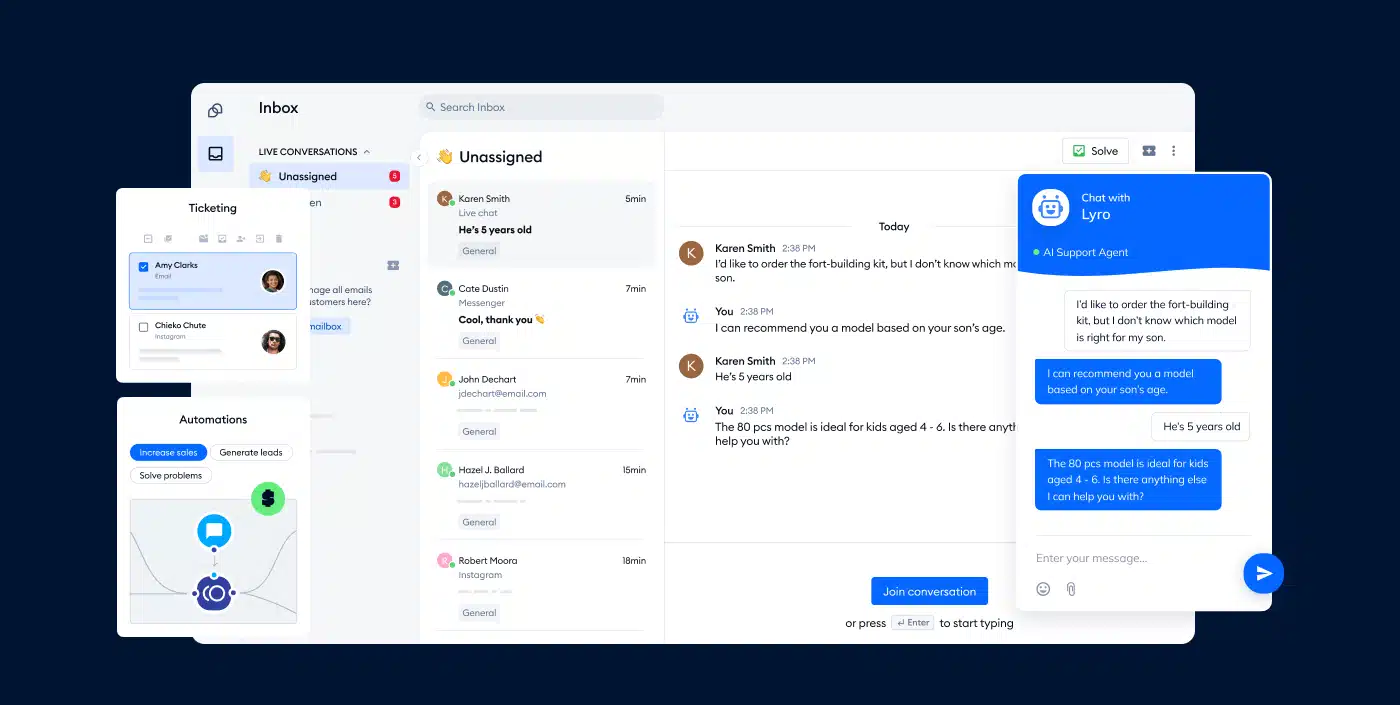
Rating: 4.7/5 ⭐️ (1,560+ reviews)
Tidio is a live chat software known for its messaging capabilities. What makes Tidio stand out are its unique AI chatbots that can be easily integrated into ecommerce sites. You can also use its live chat for sales teams and advanced help desk workflows for support agents.
This customer messaging tool helps you prepare responses to customers in advance through its live typing preview. But that’s not all — your support agents can develop a database as a way of providing canned responses, or pre-written replies, to routine customer inquiries. On top of that, you can easily install Tidio chat widget on your website, and customize it to respond to customers in their own language.
Main features:
- AI & NLP chatbots
- Shared inbox tools that allow you to streamline live chat on WhatsApp, Instagram, and Facebook Messenger
- Website visitor tracking tools to access user browsing patterns
- Ticketing system features to keep track of customers’ requests
- Multichannel customer service options including email, web, and social media apps
- 7-day free trial available
- Free version available
- Starter ($29/mo)
- Growth (starts at $59/mo)
- Plus (starts at $749/mo)
- Premium (starts at $2999/mo)
Enhance support and engagement with a robust messaging platform
2. Zendesk
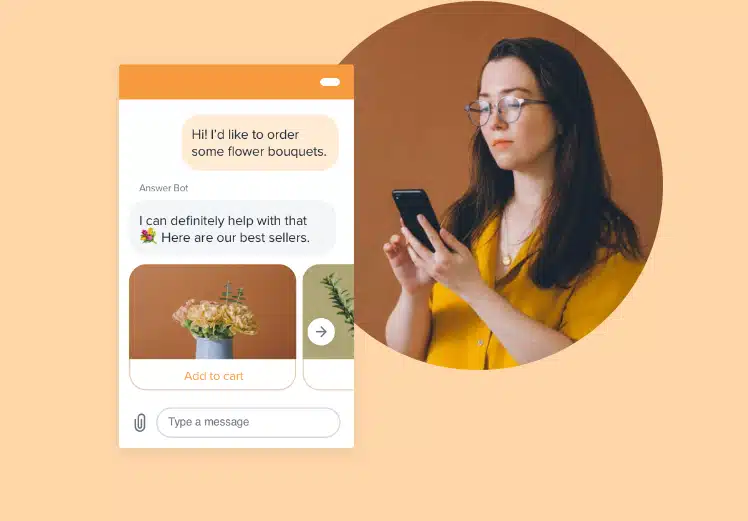
Rating: 4.3/5 ⭐️ (5,900+ reviews)
Zendesk is known for its combination of omnichannel customer service and AI-driven features to deliver personalized experiences to consumers. This conversational messaging tool helps you streamline customer interactions across various channels, including on your website, mobile apps, and productivity tools like Slack.
Its social media chatbots can automatically handle repetitive customer queries on multiple social channels, enabling your service agents to deal with more complicated requests.
Pros:
- Pre-chat survey for enhanced user experience
- Live chat triggers to initiate internal workflows
- Automated routing of incoming messages
Cons:
- Occasional system lag
- The steep learning curve for new user
- Free trial for startups
- Support Team ($19/mo/agent)
- Suite Team ($55/mo/agent)
- Suite Growth ($89/mo/agent)
- Suite Professional ($115/mo/agent)
- Suite Enterprise → Talk to sales
Read more: Check out the best Zendesk alternatives for your customer needs.
3. Zoho Desk
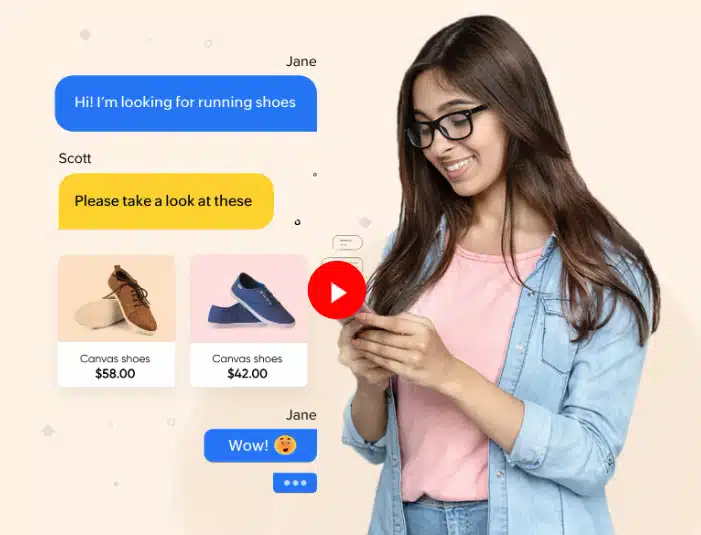
Rating: 4.4/5 ⭐️ (5,865+ reviews)
Zoho offers a live chat tool for engaging and converting website visitors to customers. Its customer messaging platform provides relevant answers to consumer queries and agents from your knowledge base. The software is unique in the sense that it encourages proactive customer service, allowing your support team to begin conversations with prospects at the right moment.
Pros:
- Scheduled visitor reports to your email
- Multichannel customer support
- Access and sync data from Zoho CRM
Cons:
- Challenges with email integration
- Currency conversion glitches
- Free version available
- Basic ($10/mo/operator)
- Professional ($17/mo/operator)
- Enterprise ($25/mo/operator)
Read more: Discover the best Zoho Desk alternatives for your business.
4. Front
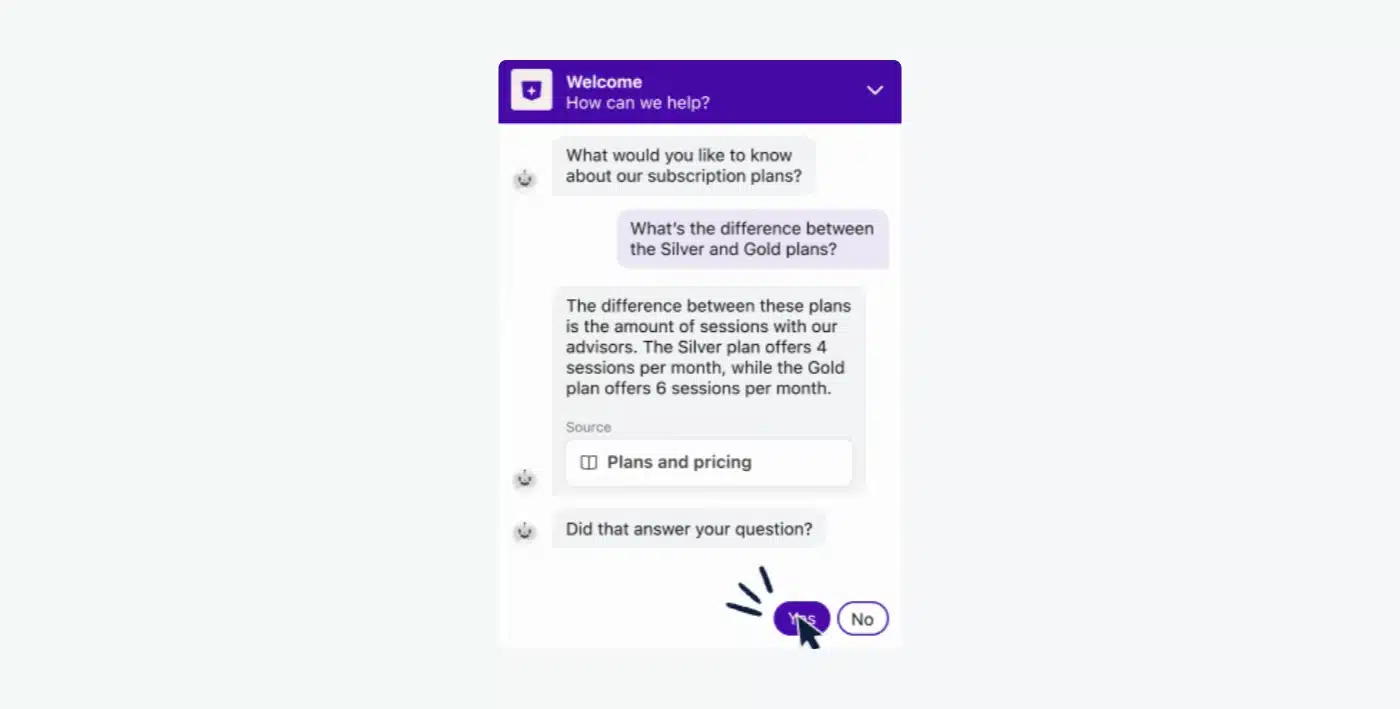
Rating: 4.7/5 ⭐️ (2,150+ reviews)
Front is a popular customer messaging system that allows you to manage customer interactions from a single location. By accessing its unified dashboard, you can keep track of customer service metrics such as response times. You can create a branded live chat widget on Front and deploy it to your website or app. The communication platform offers customizable bots that understand the context needed to automatically route your messages and responses.
Pros:
- Configurable bots according to your preferences
- AI knowledge base for automatic replies
- Simplified workflows for service level agreements (SLAs)
Cons:
- Limited range of third-party integrations
- Compatibility issues with Microsoft Office 365
- Free 14-day trial
- Starter ($29/mo/seat)
- Growth ($79/mo/seat)
- Scale → Request a demo
- Premier → Request a demo
Read more: Compare our reviews about the best Front alternatives for your online shop.
5. LiveAgent
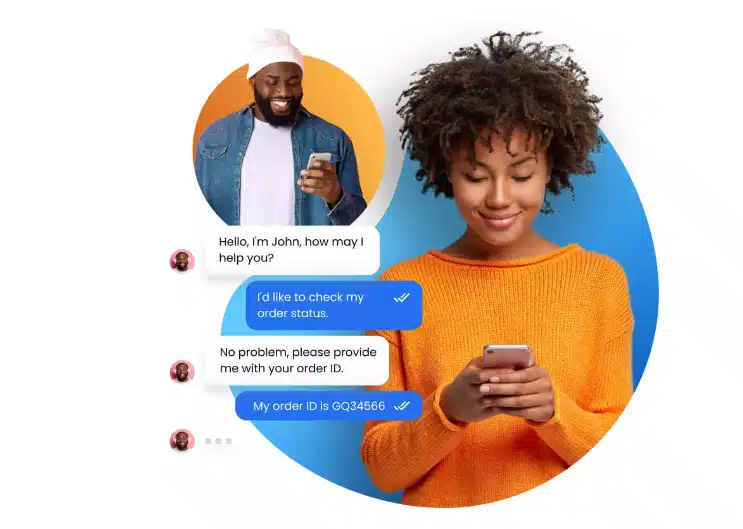
Rating: 4.5/5 ⭐️ (1,495+ reviews)
LiveAgent provides a live chat widget that facilitates text messaging and empowers you to track orders on your website. Its chat tool has a variety of messaging capabilities like proactive chat prompts, website visitor tracking, and intelligent chat routing.
In addition, you can use its omnichannel dashboard to consolidate all your communication channels. You can boost overall customer satisfaction by taking advantage of its efficient time-tracking features.
Pros:
- Offers a comprehensive contact center VoIP solution
- Proactive customer service
- In-built email marketing templates
Cons:
- Limited report and customization options
- Lacks a ticket merging feature
- Free 30-day trial
- Small business ($15/mo/agent)
- Medium business ($35/mo/agent)
- Large business ($59/mo/agent)
- Enterprise ($85/mo/agent)
Read more: Learn more about the best conversational AI platforms for online stores.
6. Freshchat
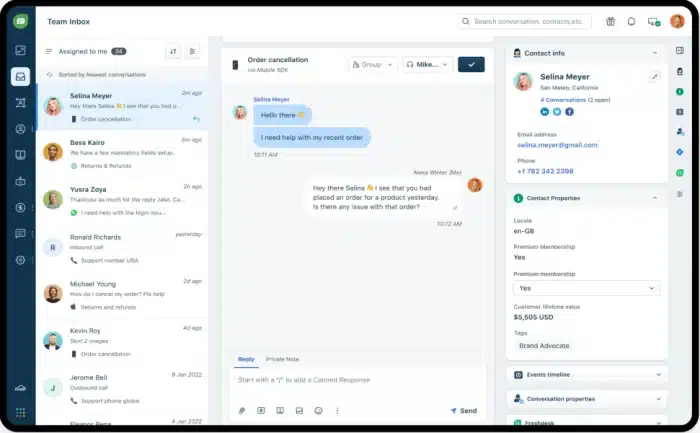
Rating: 4.4/5 ⭐️ (485+ reviews)
Freshchat is a customer engagement tool from Freshworks that enables you to manage customer interactions, access order details, and create tickets for new contacts. You can develop and deploy AI-based bots for your website and mobile apps. The software automatically exports customer data and order details to a unified dashboard. With Freshchat, you can link several online stores in one go.
Pros:
- Chatbot builder
- User-friendly interface that promotes customer onboarding
- Automated email messages
Cons:
- The lack of an in-built CSAT feature limits customer feedback
- Bot setup can be overly technical
- Free version
- Growth ($23/mo/agent)
- Pro ($59/mo/agent)
- Enterprise ($95/mo/agent)
Read more: Find out the best Freshdesk alternatives for your needs.
7. Drift
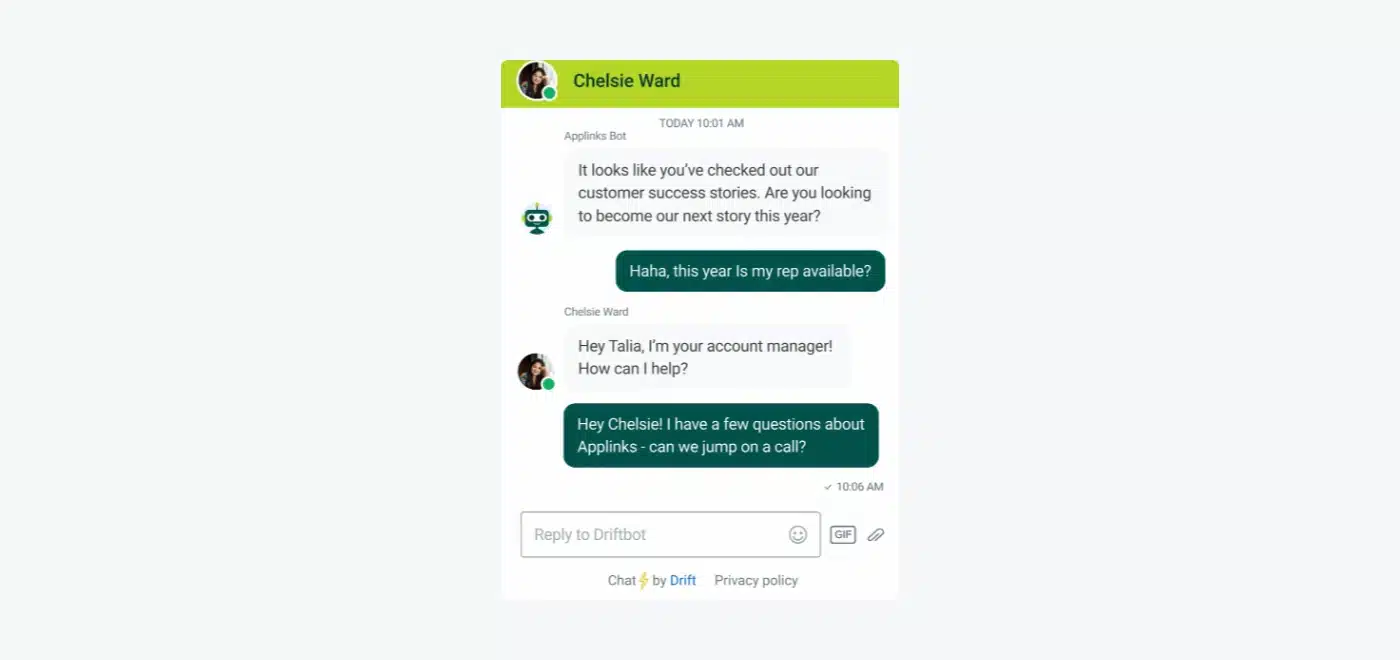
Rating: 4.4/5 ⭐️ (1,250+ reviews)
Drift is a customer messaging platform for businesses known for its conversational marketing capabilities. It offers a variety of tools such as email marketing channels, video calls, chatbots for lead generation, and more. With this platform, you can save replies for common requests and utilize them to answer frequently asked questions. Furthermore, your agents can add internal notes to conversions, and even develop several mailboxes.
Pros:
- Customer segmentation tools
- Conversational AI capabilities
- Intuitive user interface
Cons:
- Few customization options
- The presence of bugs and software glitches
- Advanced → Request a demo
- Premier → Request a demo
Read more: Find out what the best Drift alternatives are and compare their reviews.
8. Gorgias
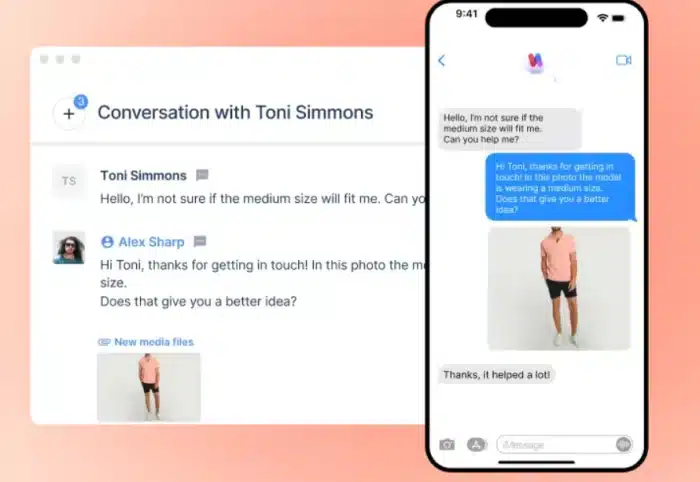
Rating: 4.6/5 ⭐️ (510+ reviews)
Gorgias is a customer communication tool that allows you to converse with your audience in real time. This multichannel messaging platform allows you to reach your audience through email, social media, chat, phone calls, and more.
You can view data like previous conversations, reviews, orders, or subscription details to understand customer sentiment. In addition, you can process refunds and design macros for excellent customer support.
Pros:
- User-friendly interface
- AI-based customer-self service center
- Proactive live chat functionality to maximize customer retention
Cons:
- Limited customization options
- Complex filtering process that makes it difficult to categorize data effectively
- Free 2-month trial
- Starter ($10/mo)
- Basic ($50/mo)
- Pro ($300/mo)
- Advanced ($750/mo)
- Enterprise → Contact our team
Read more: Check out our list of 10 Gorgias alternatives and choose the best option for your business.
9. Sprout Social
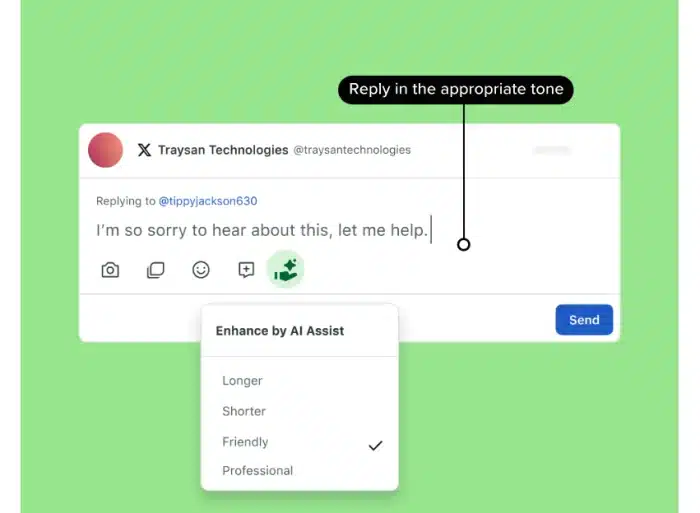
Rating: 4.4/5 ⭐️ (3,480+ reviews)
Sprout Social is a customer experience tool that helps to personalize your customer connections. It uses AI technology to reduce your team members’ manual tasks by handling large volumes of social messaging through customer service automation. The platform can enhance your customer service efforts through its AI-based summaries and response detection.
Pros:
- Shared inbox for team collaboration
- AI-driven recommendations
- Inbox and message spike alerts
Cons:
- Viewing outbound messages can be challenging
- Slow customer service
- Free 30–day trial
- Standard ($249/mo/seat)
- Professional ($399/mo/seat)
- Advanced ($499/mo/seat)
- Enterprise → Contact us for pricing
10. Crisp
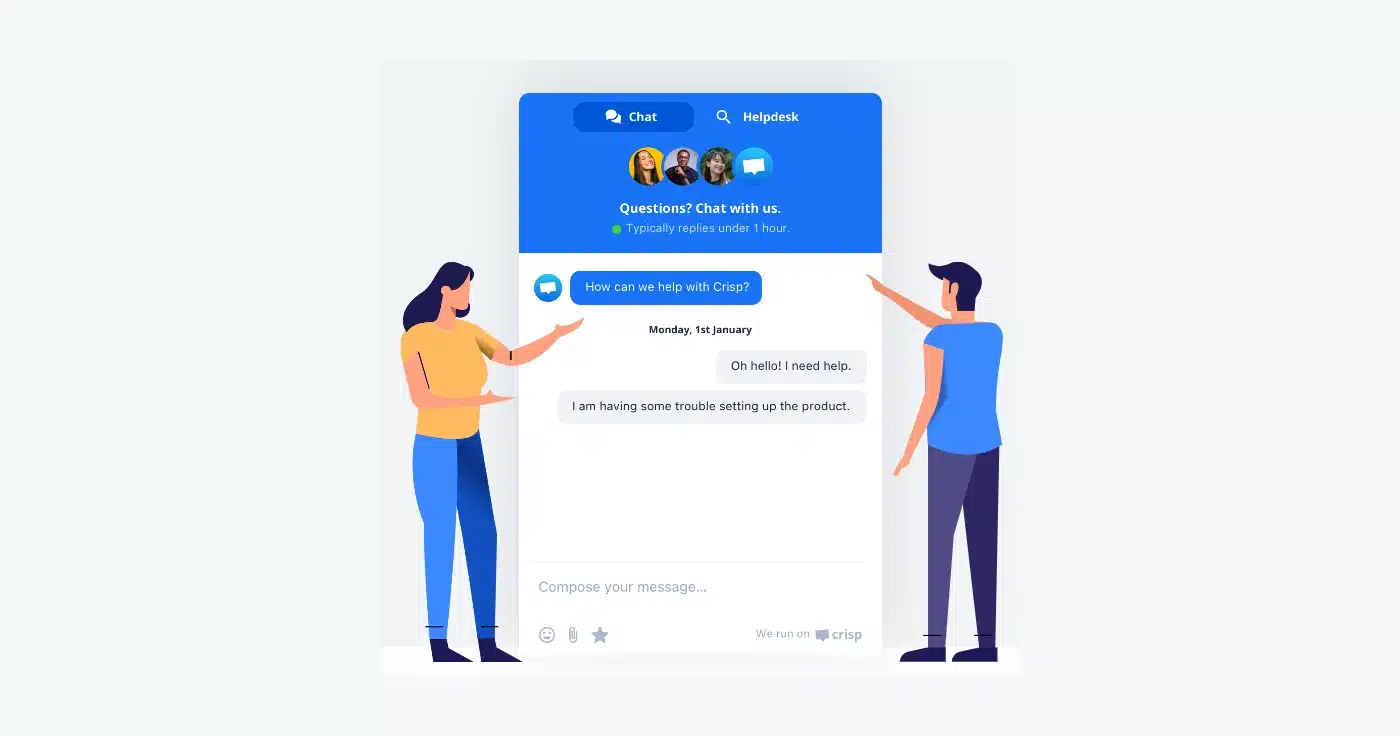
Rating: 4.5/5 ⭐️ (135+ reviews)
Crisp is a unified messaging platform that brings customer conversations, data, teams, and resources together in one place. The business messaging app provides a customizable chat widget that can be tailored to your website or ecommerce business. With this live chat software, you can send automated messages to your target audience and convert website visitors into prospects.
Pros:
- Chatbot scripts to make customer onboarding smoother
- Integrated knowledge base for web self-service
- Help desk and ticketing system for efficient support
Cons:
- Occasional wait time for operators
- Creating campaigns can be tricky
- Free version
- Pro ($25/mo/workspace)
- Unlimited ($95/mo/workspace)
Key features of customer messaging software
Choosing a text messaging platform is a crucial decision that can significantly impact your customer service strategy. Therefore, before you can settle on an instant messaging tool, find out which features are relevant to your particular use case.
Here are the main features to consider when comparing your options:
- Multichannel support — choose a software that supports communication channels frequented by your audience such as in-app messaging, web chat, SMS, social media, and email. According to a Salesforce CX survey, 75% of consumers expect a consistent experience regardless of which channel they are using to contact a company.
- Real-time chat — enables instant communication with customers, helping to answer questions and resolve issues quickly. By providing immediate support, real-time chat reduces waiting times and enhances customer satisfaction.
- Automated responses — uses AI or pre-set messages to provide instant replies to common questions, reducing response times. Automated responses can handle FAQs efficiently, allowing agents to focus on more complex issues.
- Encrypted messages and online privacy — nowadays, consumers are more concerned about their safety when transacting online. They expect messaging apps to have end-to-end encryption that secures customer conversations. Based on research by Salesforce, 90% of people are likely to trust a business if it has a solid privacy policy.
Read more: Check out how conversational customer service is impacting brands today and which are the best messaging channels for your business.
Benefits of customer messaging platforms
Consumer messaging platforms offer a variety of benefits for your business. Converting prospects is your number one priority, and any medium that allows you to connect with customers on their terms makes sense.
That said, here are the benefits of consumer messaging apps for business:
- Convenience for consumers — customers today don’t want to stop their daily activities to contact customer service about a product issue. Instead, they prefer business communication platforms that allow them to send texts while performing other tasks. According to the CX trends report by Zendesk, over 65% of consumers expect customer support interactions to be non-intrusive to their normal routine.
- Increased opportunities for personalization — an effective messaging tool will have a consumer’s conversation history, track their requests across several messaging channels, and seamlessly hand off customer queries from one agent to another. Research from Zendesk shows that 70% of customers expect service agents to have full context about their shopping history and past conversations.
- Proactive communication features — businesses can use live chat, in-app notifications, and social media messages to anticipate and address consumer concerns. This is convenient as a Salesforce survey shows over 60% of consumers expect businesses to anticipate their business needs.
Customer messaging platforms: key takeaway
Incorporating customer service text software into your customer support strategy ensures consistency across all customer touchpoints. It also provides convenience to your consumers, improved agent efficiency, and an increase in real-time sales. Therefore, select a messaging tool that allows you to create a dynamic and responsive user experience for your audience.
Tidio offers powerful messaging capabilities designed to streamline customer engagement, from the Lyro AI chatbot to an easy-to-install chat widget for your website.
Ready to enhance your customer relationships? Sign up for free and start exploring Tidio’s messaging features today.
Boost customer satisfaction with Tidio's advanced messaging platform

